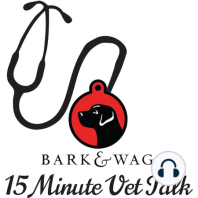13 min listen

Coronavirus and your pet with Dr. Susan McMillan. Our weekly update is now live.
Coronavirus and your pet with Dr. Susan McMillan. Our weekly update is now live.
ratings:
Length:
18 minutes
Released:
Apr 1, 2020
Format:
Podcast episode
Description
In early March 2020, the World Health Organization declared that the COVID-19 novel coronavirus is a global pandemic. In the panic over the spread of the virus, people are worried not only about their own health but the health of their dogs, cats, and other pets. Dogs wearing face masks have popped up in photos across social media, causing pet owners everywhere to ask: can dogs get coronavirus? Can dogs contract COVID-19? Dogs can contract certain types of coronaviruses, such as the canine respiratory coronavirus, but this specific novel coronavirus, aka COVID-19, is believed to not be a health threat to dogs. The World Health Organization has stated, “There is no evidence that a dog, cat or any pet can transmit COVID-19. COVID-19 is mainly spread through droplets produced when an infected person coughs, sneezes, or speaks. To protect yourself, clean your hands frequently and thoroughly.” Can dogs spread COVID-19? Li Lanjuan, an epidemiologist and representative of China’s National Health Commission cautioned pet owners in China to be vigilant about their own health and the health of their pets: “If pets go out and have contact with an infected person, they have the chance to get infected. By then, pets need to be isolated. In addition to people, we should be careful with other mammals especially pets.” The CDC says that “while this virus seems to have emerged from an animal source, it is now spreading from person-to-person.” The CDC recommends that people traveling to China avoid animals both live and dead, “but there is no reason to think that any animals or pets in the United States might be a source of infection with this novel coronavirus.” Two dogs in Hong Kong whose owners tested positive for COVID-19 have tested positive for the virus in what health officials characterize as “likely to be a case of human-to-animal transmission.” Local government health officials emphasize that “there is currently no evidence that pet animals can be a source of infection of COVID-19 or that they become sick.” Hong Kong health officials have continued to test dogs owned by people infected with the coronavirus. Officials there have stated that cases of infection in dogs appear to be infrequent. As of March 25, Hong Kong’s Agriculture, Fisheries, and Conservation Department “has conducted tests on 17 dogs and eight cats from households with confirmed COVID-19 cases or persons in close contact with confirmed patients, and only two dogs had tested positive for the COVID-19 virus.” Hong Kong officials stress that “these findings indicate that dogs and cats are not infected easily with this virus, and there is no evidence that they play a role in the spread of the virus.” Is it safe to pet my dog? According to the American Veterinary Medical Association, petting a dog’s fur is a low risk. The AVMA’s Chief Veterinary Officer Gail Golab says, “We’re not overly concerned about people contracting COVID-19 through contact with dogs and cats.” And there’s science behind that: “The virus survives best on smooth surfaces, such as countertops and doorknobs,” Golab says. “Porous materials, such as pet fur, tend to absorb and trap pathogens, making it harder to contract them through touch.” Dr. Jerry Klein, Chief Veterinary Officer for the AKC, says, “The CDC has not reported any cases of pets or other animals becoming infected with COVID-19 in the United States or anywhere else in the world, including hotbeds like Italy.” Dr. Klein urges common sense best practices when it comes to our pets: “If you have children, you wouldn’t have them touch a puppy and put their fingers in their mouth, because they can have fecal contamination,” he says. “The general practice of washing our hands after touching a puppy or a dog—that’s normal hygiene.” Can I walk my dog? Physical and mental exercise are extremely important for dogs and dog owners alike. Before taking a walk, check your local regulations. As long as the area where you reside remains safe enough to ventu
Released:
Apr 1, 2020
Format:
Podcast episode
Titles in the series (100)
Bark & Wag 15 Minute Vet Talk: Puppy Love and Socialization by Bark n Wag 15 Minute Vet Talk